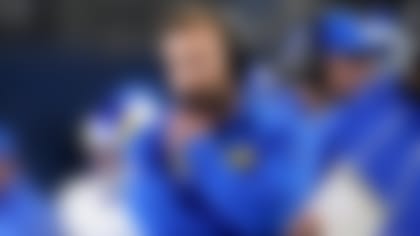NFL vice president of officiating Dean Blandino spoke with NFL Media's Amber Theoharis regarding the controversial final play of Monday night's game, where the Carolina Panthers edged the New England Patriots. The interview aired Tuesday on NFL Network's "NFL Total Access." A transcript of the interview is provided below:
On NFL Network
NFL Replay
will re-air the
Carolina Panthers' 24-20 win over the
New England Patriots from Week 11 on Wednesday, Nov. 20 at 9 p.m. ET.
BLANDINO: Let's go through the play. Here is (Patriots tight end Rob) Gronkowski in the formation. The back judge in the middle of the field -- he's on the end line -- that's his key. We have (Patriots tight end Aaron) Dobson down here; the side judge who is on the goal line -- that's his key. Let's watch the play develop. The back judge is going to see restriction right there and he's going to throw his flag for that restriction. The side judge who had Dobson, his mechanics are, once the ball is in the air, he's going to go to the ball and he's going to focus on the interception.
After the play -- you'll see the flag come out -- the back judge is going to signal to the side judge and they're going to get together and have a discussion. What they're going to talk about is, "When did the restriction occur in relation to the ball being touched?" Because once the ball is touched, you cannot have pass interference. This is a judgment call; the officials don't have the use of replay. They don't have slow motion replay, and ultimately they ruled that the restriction occurred simultaneously with the ball being touched. When you watch it at full speed, you could see why they would make that call on the field.
THEOHARIS: Should the flag have been picked up once it was thrown on the field?
BLANDINO: Again, it's a judgment call. There was contact, but there is contact on a lot of passing plays downfield. The issue isn't the contact; the issue is the restriction. Does it occur prior to the ball being touched? At full speed, the officials made a tight judgment call and they determined that the restriction occurred just as the ball was being touched. Again, at full speed you could see why they made that call.
THEOHARIS: We understand it's a judgment call but in your opinion, were the officials wrong?
BLANDINO: I wouldn't say that they were wrong. Again, they have to make this call. They used proper mechanics. They got together after the play. They determined that in their judgment the contact occurred simultaneous with the ball being intercepted, and that's why the officials did what they did.
THEOHARIS: We know this play is not reviewable -- pass interference is a judgment call -- but was it the correct call by the officials?
THEOHARIS: We know that the league evaluates officials on a weekly basis. When you evaluate this particular crew this week, will they receive a poor grade, something you call being "downgraded" for this play?
BLANDINO: For this play, no. When we look at tight judgment calls like this and we feel that the officials followed proper mechanics, we do not downgrade the officials for this type of situation.
THEOHARIS: So this particular play will not affect their postseason assignments as an officiating crew, correct?
BLANDINO: This play will not affect their postseason assignments as far as where they'll be assigned.
Additionally, as part of Tuesday's interview on "NFL Total Access," Blandino will discuss the call on San Francisco 49ers linebacker Ahmad Brooks in the team's loss Sunday to the New Orleans Saints.



